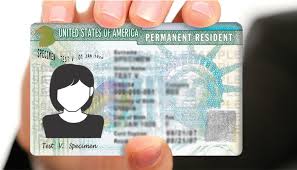Learn More About:
Immigration News & Updates eNewsletter © 2011 - 2021
For questions about U.S. Residency, Green Cards and Immigration Visas, Visit our Website at: www.ImmigrateToday.com or call our office at: (954) 382-5378
Check Out This Cool Stuff For Immigrants....
Immigration
Questions & Answers
This Week's Immigration News
Immigration News & Updates
Immigration How To:
How Do I Know If I Can Get A Copy Of My Immigration Papers?
Questions About Immigration? We have the answers!
We Are Here To Help, Call us now for a FREE consultation (954) 382-5378
Trump’s Public Charge Rule Finally
Terminated- No More Form I-944, Yay!!!
AMERICAN IMMIGRATION
LAW CENTERS
Immigration Questions: (954) 382-5378
POSTING DATE: March 15, 2021
Question: My mother is a citizen in the USA. I came here about a month ago. I am a married adult. I would like to know if I can stay in the USA until my mother files for me and how long would it take for the filing to come through cause I heard that if I stay in America it would be finalized within two years instead of me leaving America then it would take longer if I go back home?
Tips On Renewing Your Child’s Green Card - For Free!
American Immigration
Law Center
2645 Executive Park Drive
Suite 137
Weston, Florida 33331
Immigration rules and regulations can be obscure, seem mysterious and are often complicated. So it’s nice to come across a rule which is actually beneficial and saves you money! Under a little-known law, once a U.S. Resident child turns age 14, a Green Card renewal must be filed within 30 days. This special requirement exists because children under age 14 are exempt from the fingerprinting, so once a child reaches age 14, he or she must provide biometrics fingerprints as part of the renewal process. However in practice, most parents do not follow the rule to renew their children’s Green Cards and no penalty is applied by the USCIS for failure to do so.
As expected, the USCIS announced last week that it will no longer apply Trump’s evil Public Charge Rule. Under the rule, all residency applicants filing form I-485 were required to submit form I-944 along with documentation to establish assets, income and the likelihood that they would not have to rely on public assistance in the future. Effective March 9, residency applicants no longer need to submit Form I-944. The USCIS notice says it will not review any I-944 forms already submitted, and that applicants can disregard Request for Evidence of Notice of Intent to Deny that request information related to the Public Charge Final Rule.
Helpful Immigration Tips You Can Use...
Lying On A Consular Visa Application Can Cost You Your Immigration Dreams!
Many Immigrants believe that the information they provide on the application for a nonimmigrant visa (called DS160) abroad is just a one time thing and somehow disappears once they are issued or denied a U.S. visa. Most are not aware that the information provided when applying for non-immigrant visas at consulates abroad can later be used against them during an immigrant visa or residency interview.
Problematic issues related to consular visa applications usually arise when an immigrant fails to reveal or conceals information about family members living in the U.S.. i.e., that a brother, sister, parent, fiancée, and/or spouse is living in the U.S..
Tips On Filing A Freedom of Information Act (FOIA)
To Request A Copy Of Your Immigration Case
Its always important to keep a copy of your immigration documentation, including your I-94 Arrival/Departure card, original passport that you entered the U.S. on, immigration applications made by you or on your behalf, as well as immigration notices and letters. However, many Immigrants who have been living in the U.S. for many years have often moved several times and lost since lost these vital documents.
President Biden Grants TPS To Venezuelans As Promised!
As promised during his campaign, President Biden has designated nationals of Venezuela for Temporary Protected Status (TPS) beginning March 9, 2021. This new designation enables Venezuelans who have been in the U.S. since on or before March 8, 2021 to apply for protected status and obtain a work and travel permit, social security card and driver’s license.
Venezuelans who qualify for the program will receive an 18-month TPS status and will likely be eligible to extend that status every 18 months nearly indefinitely for many years into the future.
For background, TPS status is generally granted to nationals of countries which have experienced natural disasters, wars or other humanitarian crises which make it unsafe for nationals to return home.
USCIS Provides Relief To Students Applying
For Work Authorization Through (OPT)
The Biden team took over a USCIS agency in crisis, understaffed, disorganized, processing backlogs in nearly every immigration application category and harsh anti-immigrant policies that went against our nation’s creed as a country of immigrants. Under Trump’s watch, the agency treated both immigrants and non-immigrants who dared to apply for immigration benefits that are guaranteed by our laws and regulations, like enemies. And to make it difficult, rules were twisted to delay and deny benefits whenever possible.
That is all changing now, however, it’s important to recognize that nothing happens overnight, so improvements will steadily begin showing up in USCIS’s overall operations as the months roll by.
Answer: Under current law, the waiting line is about 12 years, and you CANNOT stay inside the U.S. during that time. If you come here and stay, you will no longer be eligible to immigrate to the U.S.. However, there is legislation pending in Congress which was proposed under President Biden which would reduce that time, however, there is no certainty that it will become law. I hope this information is helpful to you.
However, my suggestion is that those who receive such requests should instead simply write their name and address and sign it and send it back in. This is a safeguard to make sure that your case continues to progress through the system smoothly.
Venezuela’s ongoing political upheaval, repression, insecurity and food and medical shortages have caused thousands of Venezuelans to flee every year to seek refuge in the U.S. and other countries. During its tenure, the Trump administration refused to issue TPS to Venezuelans for four years, only to grant them a less protective DED status just days before leaving office.
Biden’s full grant of TPS status means that Venezuelans who are in the U.S. since on or before March 8, 2021, can apply for protected status to live and work in the U.S. and travel abroad (with travel authorization) until the conditions in Venezuela improve, which could take decades. Under the U.S. Citizenship Act of 2021 immigration reform legislation recently introduced by Democrats in Congress, TPS holders who have held such status for a certain number of years would be able to apply for residency.
To qualify, Venezuelans need to provide:
1) Proof of Venezuelan Nationality
2) Proof of Date of Entry into the U.S.,
3) Proof of Residence in U.S. from on or before March 8, 2021 to the present and
4) that they not have been convicted of any serious crimes.
Documentary proof of physical presence in the U.S. is especially important for Venezuelans who have been inside the U.S. for several years in order to demonstrate that they have continually lived in the U.S. and have not left since their last entry. The TPS Registration period for Venezuelans runs from March 9, 2021 through September 5, 2021.
For more information or assistance with the TPS process
you can contact us for a free consultation at: (954) 382-5378
But what if there were a benefit to filing a renewal (form I-90) on your child’s 14th birthday? Well there is ….to a lucky few! The USCIS actually waives the application fee for Green Card renewal applications filed for children within 30 days of their 14th birthday, as long as the child’s Green Card will expire after the child turns age 16. Strange, but true. The catch is that there is only a very short 30 day period in which the renewal can be filed without paying the USCIS filing fee and those exact requirements must be met. For instance, if a child is turning age 14, but their Green Card expires when the child is 15, the filing fee would not be waived. Similarly, if the child has turned age 14 and you filed after 30 days, the fee is not waived. In all cases the biometrics fee of $85 must still be paid, but you will still be saving $455 for the regular renewal fee. Good to know!
Administration professionals are reviewing all aspects of the agency for improvements which will benefit efficiency, processing times and customer service. One such improvement is the treatment given to F-1 international students who are graduating college and applying for work permits under the Optional Practical Training program called “OPT”. These work permits are generally issued for 12 to 14 months.
Students applying for OPT last year had a really difficult time, first in just getting the USCIS receipt, which took months, then in processing times which took many more months. By the time the USCIS actually processed the request and issued the work permit, nearly half the time had already expired! As a result, the new administration has taken corrective measures to alleviate the situation. Under new procedures, the USCIS is providing additional flexibilities to qualifying F-1 students filing form I-765 based on OPT in light of its ongoing processing delays. It will apply to I-765 applications submitted on or after October 1, 2020 through May 1, 2021.
Beginning now, the agency will approve OPT applications for the full amount of time originally requested in the application. Those who received less than the full amount of OPT time requested (up to 12 months) may now make a request a correction of the EAD due to USCIS error. Further, any OPT application made which were rejected for improper signatures or some other technical error can now be refiled, as long as the original OPT application was filed no later than 60 days after the program end date.
Question: My daughter is married to a citizen and she recently got her citizenship as well. Now she wants to sponsor me and my husband. My husband is not her natural father, but he lived with us since she was five and he is the only father she has ever known. We got married a few years ago when my daughter was 20, due to lots of family urging us to do so after all these years . So our questions is whether our daughter will be able to sponsor us together to immigrate, or how would that work. Thanks.
Answer: This is a very common question and often very confusing to parents of U.S. Citizens. Parents of U.S. Citizens are called “Immediate Relatives” (as are Spouses and Minor children).U.S. Immigration regulations only allow U.S. Citizens to sponsor each of their Immediate Relatives separately and no dependent spouses or minor children are able to immigrate along with them. For instance, a U.S. Citizen child cannot sponsor his or her parents together as a couple, instead, each parent must be sponsored separately in a separate family petition. Step-parents are considered to qualify as “parents” for immigration purposes, as long as the biological and step-parent got married before the child reached the age of 18. Therefore, your daughter can sponsor you and you can immigrate to the U.S. in about a year. However, your husband does not qualify as a step-parent since you did not get married before your daughter was age 18, therefore your daughter cannot sponsor him. However, once you obtain your green card, you can immediately sponsor your husband and it will take about a year or so for him to be able to immigrate to the U.S.. If you have tourist visas and are inside the U.S. the process is much shorter, likely about 8 months or so. Let me know if you would like me to handle your residency case.
Question: I am Venezuelan and in the U.S. since last year on a F1 student visa. Due to getting covid I got really sick and had to drop out of school in the fall and now the school says I am not in legal status in the sevis system. My question is whether I am eligible to get TPS status since I am here on a student visa, can you apply that for me? Can I travel with TPS?
Answer: Yes, no problem, all nationals of Venezuela who are inside the U.S. as of March 8, 2021 are eligible, regardless of visa status. TPS holders are eligible to apply for a travel permit which allows them to travel abroad for brief trips and return to the U.S. Give us a call and we will provide you with a document list of what we need to get your TPS application filed quickly.
Other problematic issues involve providing false information about past visa refusals, past criminal activity or convictions, date of birth and information about current and past marriages. These discrepancies can often come back to “haunt” an immigrant later, when he or she is applying for an immigrant visa or residency in the U.S. and is then required to provide documentation to prove eligibility. Information provided at the residency stage with conflicts with the old visa application can result in a finding of “misrepresentation”, which can make an immigrant ineligible to immigrate to the U.S..
U.S. visa policies are very strict and have become even more onerous under Trump administration rules. As a result, individuals seeking to obtain a U.S. visa are often told by friends, family and visa services not to list relatives they have in the U.S. since the fact that they have family members living in the U.S. will result in a denial if their visa, which can be true. Similarly, visa applicants who list that they are married are often more likely to be issued a visa than single applicants, since the consular officer believes that if the applicant has a spouse residing abroad, the applicant is more likely to return to their home country and not over stay their visa in the U.S.
The problem comes later when an immigrant is sponsored by a family member who is in the U.S. and was not listed on his or her application. For instance, an applicant has a parent who is a U.S. Citizen living in the U.S.. The applicant does not list that the parent is a U.S. Citizen in the U.S.. Then the parent later sponsors the child to immigrate to the U.S.. Failure to list the parent’s immigration status in the U.S. is likely going to result as a finding of misrepresentation on the child’s part and will likely prevent the child from being eligible to immigrate to the U.S..
Similarly, if an applicant for a non-immigrant visa lists themselves as married on the visa application, then is later sponsored by a U.S. Citizen or Resident spouse or other family member, in all cases the immigrant will be required to provide official governmental evidence of the marriage or divorce. If the immigrant fails to do so because they were in fact never married, a finding of misrepresentation will likely result in immigrant visa or residency denial based upon fraud. Importantly, even if visa service prepares and files a visa application, the applicant themselves is held responsible for all answers and any discrepancies later found on the application.
There are waivers available to individuals in very limited circumstances, which act as a forgiveness for the fraud or misrepresentation, and allow entry to the U.S. However, these waivers are highly discretionary and can often be very difficult, if not impossible to obtain. So the moral of the story is, never lie or omit information on a DS160 application, since even a slight misrepresentation can prevent an applicant from every visiting or immigrating to the U.S. in the future.
So in these turbulent times, with constant government threats against even legal immigration, it’s more important than ever for immigrants to fully understand their immigration status and have possession of any immigration documentation they may need to help determine whether or not they are eligible to obtain residency through a family member or by other means. In these cases, filing a Freedom of Information Act (FOIA) request with federal immigration authorities can be very useful to obtain critical information on an individual’s immigration history and even some documents to prove legal entry, when the I-94 card or old passport has been lost over the years.
FOIA requests do not trigger any kind of negative action on an immigrant’s case, but they can often take many months to process. The key to success is to provide full and complete information to enable the agency to locate the file and any related case information pertaining to the applicant. Depending on an immigrant’s particular case, documentation may sometimes be held by various government agencies, including: U.S. Citizenship and Immigration Services (USCIS), Customs and Border Protection (CBP), Department of State (DOS), the Executive Office of Immigration Review (EOIR), and, for some, the Federal Bureau of Investigations (FBI). In these cases, a separate FOIA must be requested from each agency separately.
Before undertaking a FOIA request, it is important to understand that not all documents are available under FOIA, including requests to obtain duplicate approval notices or original documents submitted to the USCIS. Typically, documents which can be obtained are copies of Immigration case filings, applications, including supporting documents and immigration court documents. FOIA’s can also be particularly important when an immigrant has lost a copy of a vital document such as an I-94 which was previously submitted to the USCIS as part of an Immigration application. We can make a Freedom of Information Act (FOIA) request on your behalf, just give us a call at: 954-382-5378.
Learn more about filing a Freedom of Information Act (FOIA) for Immigration case copies:














